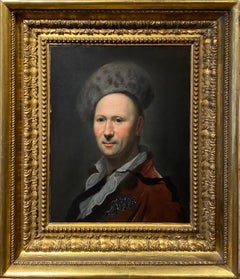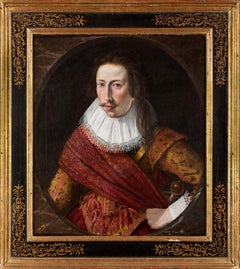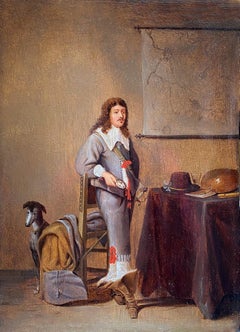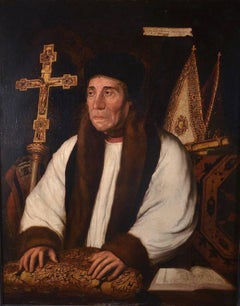Want more images or videos?
Request additional images or videos from the seller
1 of 5
UnknownPortrait of a Carthusian Monkcirca 1573
circa 1573
About the Item
- Creation Year:circa 1573
- Dimensions:Height: 23 in (58.42 cm)Width: 18 in (45.72 cm)
- Medium:
- Movement & Style:
- Period:
- Condition:
- Gallery Location:London, GB
- Reference Number:1stDibs: LU5243326163
About the Seller
5.0
Gold Seller
Premium sellers maintaining a 4.3+ rating and 24-hour response times
Established in 2007
1stDibs seller since 2014
85 sales on 1stDibs
Typical response time: 4 hours
Authenticity Guarantee
In the unlikely event there’s an issue with an item’s authenticity, contact us within 1 year for a full refund. DetailsMoney-Back Guarantee
If your item is not as described, is damaged in transit, or does not arrive, contact us within 7 days for a full refund. Details24-Hour Cancellation
You have a 24-hour grace period in which to reconsider your purchase, with no questions asked.Vetted Professional Sellers
Our world-class sellers must adhere to strict standards for service and quality, maintaining the integrity of our listings.Price-Match Guarantee
If you find that a seller listed the same item for a lower price elsewhere, we’ll match it.Trusted Global Delivery
Our best-in-class carrier network provides specialized shipping options worldwide, including custom delivery.You May Also Like
The Card Players by a Flemish 1600s Artist
By Flemish School, 17th Century
Located in Stockholm, SE
Flemish 1600s School
The Card Players
oil on oak panel
panel dimensions 22.5 x 20 cm
frame included
Provenance:
From a Swedish private collection.
Condition:
Flat and stabl...
Category
17th Century Old Masters Figurative Paintings
Materials
Oak, Oil, Panel
$2,481
H 8.86 in W 7.88 in
Tri-Directional Portrait Commemorating the Russo-Turkish War
Located in New Orleans, LA
Austrian School
18th Century
Tri-Directional Portrait Commemorating the Russo-Turkish War
Oil on wooden strips
This extraordinary tri-directional portrait exemplifies the rare innovation known as a triscenorama, capturing a pivotal diplomatic moment through ingenious artistic technique. Employing triangularly cut wooden strips, this remarkable work simultaneously depicts three imperial figures central to the Russo-Turkish War of 1735-1739: Empress Anna Ivanovna Romanova of Russia when viewed directly, Holy Roman Emperor Charles VI from the left and Ottoman Sultan Mahmud I from the right, commemorating the Treaty of Nissa that concluded this significant European conflict.
The portrait utilizes an exceptionally rare optical technique that predates modern movable imaging technology. When observed from different angles, the painted triangular wooden strips create a transformative effect, revealing entirely different imperial portraits as the viewer shifts position. The precision required to execute such a work demonstrates remarkable technical mastery, as the artist had to conceptualize three distinct portraits as well as the meticulous arrangement of the panels. This sophisticated manipulation of perspective creates an interactive viewing experience considered revolutionary for its time.
Almost certainly created by an Austrian artist, this diplomatic artwork likely served as a commemorative piece marking the Treaty of Nissa, signed in September 1739. The treaty concluded Russia's ambitious campaign to secure access to the Black Sea while countering Ottoman raids in Ukraine and the Caucasus regions. Given its exceptional quality and historical significance, this portrait was possibly commissioned by Emperor Charles VI himself, potentially serving as a diplomatic gift to either Empress Anna or Sultan Mahmud I during the treaty negotiations.
Under Empress Anna's leadership, Russia sought to counter devastating raids from Ottoman allies, particularly the Crimean Tatars...
Category
18th Century Old Masters Portrait Paintings
Materials
Wood, Oil, Wood Panel
$148,500
H 18.88 in W 15.88 in D 2 in
Madonna with Holy Child and St. John
Located in Fredericksburg, VA
Madonna with Holy Child and St. John is a masterful depiction of a tender religious scene, capturing the sacred relationship between the Virgin Mary, the infant Jesus, and St. John t...
Category
17th Century Old Masters Portrait Paintings
Materials
Wood, Oil
Portrait of Senator Bartolomeo Panciatichi by Santi di Tito (1574)
Located in PARIS, FR
This recently rediscovered portrait of Santi di Tito depicts a Florentine senator, with a letter in his hand indicating that the painting was executed in 1574 when the sitter was 66 years old. On the basis of these clues, it is tempting to view it as a portrait of Bartolomeo Panciatichi, who was painted some thirty years before by Bronzino (1503 - 1572). While the treatment of the hands recalls the Florentine tradition of Mannerist portraits, the comparison with Bronzino's portrait illustrates Santi di Tito's search for greater realism, despite the stereotyped composition.
1. Santi di Tito, Counter-Reformation painter and portraitist
Santi di Tito was the great painter of the Florentine Counter-Reformation. He proposed a new artistic language that broke away from Mannerism.
Little is known about his training in Florence (perhaps alongside Bronzino or Baccio Bandinelli), but this period of training enabled him to join the Company of Saint Luke, the guild of Florentine painters, in 1554. Between 1560 and 1564, Santi di Tito spent time in Rome, where he frequented the workshop of Taddeo Zuccari. This stay had a fundamental influence on his work, thanks to the discovery of the late work of Raphael, but also his encounters with the painters Francesco Salviati and Federico Barocci.
Around 1565, Santi di Tito returned to Florence, where he remained until the end of his life, dividing his talents between the creation of important religious paintings and countless portraits. He became one of the city's leading painters, distinguishing himself, in particular, in the creation of large religious compositions in which the spirit of the Counter-Reformation was reflected.
In 1568, Santi di Tito became a member of the Confraternity of Saint Thomas Aquinas...
Category
16th Century Old Masters Portrait Paintings
Materials
Poplar, Oil
$95,000
H 51.19 in W 41.33 in
Antique Late 18th Century Oil Painting Allegorical Charity Scene Baroque Frame
Located in Stockholm, SE
This scene depicts the allegorical figure of Charity (Latin: Caritas - love, mercy), which is traditionally portrayed as a woman nursing an infant surrounded by other children, symbo...
Category
Late 18th Century Old Masters Figurative Paintings
Materials
Canvas, Wood, Oil
$645
H 24.8 in W 21.9 in D 1 in
17th century German portrait of the wine merchant Caspar Roemerskirchen
Located in Aartselaar, BE
17th century German portrait of the wine merchant Caspar Roemerskirchen at the age of 26 in 1628
This highly decorative portrait depicts the 26 year old Caspar Roemerskirchen, weari...
Category
17th Century Old Masters Portrait Paintings
Materials
Wood, Oil
$14,770
H 37.8 in W 29.53 in
Portrait of a Lady, After Sir Peter Lely (1610-1680) Oil Painting
By After Sir Peter Lely
Located in Uppingham, GB
Oil Painting After Sir Peter Lely (1610-1680) Portrait of a Lady
Housed in a Lely gold Leaf Frame.
Peter Lely:
In 1647 he became a member of the Pain...
Category
17th Century Old Masters Portrait Paintings
Materials
Oil
$16,753
H 57 in W 47 in D 4 in
Male and female portrait, both in silk kimono, possibly textile dealers
By Christoffel Lubieniecki
Located in Amsterdam, NL
CHRISTOFFEL LUBIENIECKI (1659-1729)
Pair of portraits of a gentleman and a lady, both in silk kimono, before a country house (circa 1680)
Indistinctly signed “C.......” on a box under the man’s left hand
Oil on canvas, 79.5 x 67 cm each
Both sitters are portrayed wearing a silk “Japanese” coat. During the second half of the seventeenth the Japanese silk coat, an adapted Japanese kimono, became a real vogue in the Dutch elite. The exclusive Dutch trade contacts with Japan can explain the popularity of the kimono-style silk coats in the Netherlands. Everybody who could afford one, dressed in such a fashionable and comfortable coat and, like the present sitters, some proud owners had themselves portrayed in a “Japanese” coat often together with an oriental carpet to underline their standing and international connections. These portraits are the work of the Polish-born portraitist Christoffel Lubieniecki (also known as Lubienitski, Lubinitski or Lubiniecki)
Lubieniecki was first trained in Hamburg under Julian Stuhr and after 1675 in Amsterdam under Adriaen Backer and Gerard de Lairesse. He specialized in landscapes, generally of an Italianate character, and in portraits. The loving execution of these contented burghers, enjoying the garden vistas of their country house, places him alongside Amsterdam portraitists such as Constantijn Netscher and Michiel van Musscher...
Category
1680s Old Masters Portrait Paintings
Materials
Canvas, Oil
$37,811
Free Shipping
H 31.34 in W 26.38 in D 1.97 in
18th-19th Century By Natale Schiavoni Portrait of the sister Oil on Cardboard
By Natale Schiavoni
Located in Milano, Lombardia
Natale Schiavoni (Chioggia, Italy, 1777 - Venice, Italy, 1858)
Title: Portrait of the sister
Year: 1854
Medium: Oil on cardboard
Dimensions: without frame 14.5 x 12 cm - with frame 2...
Category
19th Century Old Masters Portrait Paintings
Materials
Oil, Cardboard
$6,238 Sale Price
20% Off
H 5.71 in W 4.73 in
16th Century by Giovanni Maria Butteri Portrait of Francesco I Oil on Panel
Located in Milano, Lombardia
Giovanni Maria Butteri (Florence, Italy, 1540 - 1606)
Title: Portrait of Francesco I
Medium: Oil on panel
Dimensions: without frame cm. 47.7 x 39 - with frame cm. 55.2 x 46.5
Expertise by Carlo Falciani, art historian
Fairs: The International Biennial of Antiques in Florence 2024 (BIAF, Biennale Internazionale dell’Antiquariato di Firenze)
Publications: From Sacro to Profano, the Giorgio Baratti art collection from Milan, exhibition catalogue curated by Daiva Mitrulevičiūtė, Giovanni Matteo Guidetti and Ileana Maniscalco, (16 February – 27 September 2020), Vilnius, National Museum - Palace of the Grand Dukes of Lithuania, pp. 566-569.
This valuable portrait, by the painter Giovanni Maria Butteri, an exponent of Mannerism and active mainly in Florence, portrays Francesco I de' Medici (1541 - 1587) eldest son of the Grand Duke of Tuscany...
Category
16th Century Old Masters Portrait Paintings
Materials
Panel, Oil
$26,278 Sale Price
20% Off
H 18.78 in W 15.36 in D 2.37 in
More From This Seller
View AllPortrait of Conrad Friedrich Hurlebusch, Early 18th Century Oil Painting
By Dominicus van der Smissen
Located in London, GB
Dominicus van der Smissen
Early 18th Century
Portrait of Conrad Friedrich Hurlebusch
Oil on canvas
Image size: 20½ x 16¼ inches
Period gilt frame
This is a portrait of Conrad Friedrich Hurlebusch, composer, Kapellmeister and organist, whom Van der Smissen most probably portrayed during his stay in Hamburg, Brunswick or Amsterdam. The identification is based on the reproduction of the portrait which was engraved by Pieter Anthony Wakkerdak (1740- 1774).
Van der Smissen has reduced the face of the sitters to an egg-shaped oval in three-quarter view, applying diminution to one half of the figure’s torso, which is farther away from the viewer. This partial side view, with the head turned to look at the viewer over the shoulder, creates spatial depth and brings the figure to life by avoiding the stiffness of a frontal depiction.
Because the artist chose to highlight the figure from above, a distinct shadow is cast under the tip of the nose, in the shape of a triangle. This is an often recurring and almost ‘signature’-like feature in Van der Smissen’s oeuvre.
Hurlebusch's garments are of a very high quality and serve to reflect the sitter’s wealth, status and elegance. During this period, gentlemen often shaved their heads in order to facilitate the wearing of a wig, which wouldbe worn with a suit. Here Hurlebusch has been depicted in a luxurious turban-like cap lined with lynx fur, a highly fashionable and expensive material at the time.
Over his shirt, he wears a velvet fur-lined gown adorned with decorative clasps fashioned from silver braid. The elegant informality of his appearance can be seen in his unbuttoned shirt and the unfastened black ribbon hanging from his button hole, which has been artfully arranged into a fluttering drape by the portraitist.
The Sitter
Hurlebusch was born in Brunswick, Germany. He received the first instructions in his field from his father Heinrich Lorenz Hurlebusch, who was also a musician. As an organ virtuoso, he toured Europe, visiting Vienna, Munich and Italy.
From 1723 to 1725 he was Kapellmeister in Stockholm; later he became Kapellmeister in Bayreuth and Brunswick, and lived in Hamburg from 1727 to 1742, where he had contact with fellow composers Johann Mattheson and Georg Philipp Telemann. He made his living composing, performing and teaching.
In 1735 and 1736, he is believed to have visited Johann Sebastian Bach in Leipzig, who promoted Hurlebusch’s compositions as the local seller...
Category
Early 18th Century Old Masters Portrait Paintings
Materials
Canvas, Oil
Portrait of an Officer, Cornelius Johnson, 17th Century Old Masters
By Cornelius Johnson
Located in London, GB
Circle of Cornelius Johnson
Circa 1620’s
Portrait of a Officer
Oil on canvas
Image size: 28 x 24 inches
Period style hand made frame
Provenance
Private European Estate
This striking portrait dates to around 1620, as you can see from the images of the sash the detail is very high. The sash is decorated with gold thread and would have cost a small fortune at the time. Sashes were originally developed for a military function (making officers more visible for their men during combat), but soon became a primarily male fashion...
Category
Early 17th Century Old Masters Portrait Paintings
Materials
Oil
Soldier in an Interior, Early 17th Century Dutch Oil
Located in London, GB
Pieter Symonsz Potter
Dutch 1600 - 1652
Soldier in an Interior
Oil on oak panel, red seal to reverse
Image size: 15 x 10 3/4 inches
Dutch Ebonised frame
Bathed in a well lit roo...
Category
Early 17th Century Old Masters Portrait Paintings
Materials
Oil, Board
PORTRAIT OF WILLIAM WARHAM, Old Masters Oil on Wood
Located in London, GB
after HANS HOLBEIN THE YOUNGER
1497 – 1543
PORTRAIT OF WILLIAM WARHAM
Oil on canvas
Image size: 38 x 35 inches (89 x 71 cm)
Hand made period style frame
The handling of the paint in...
Category
18th Century and Earlier Old Masters Portrait Paintings
Materials
Canvas, Oil
Portrait of a Lady, 17th Century Flemish Oil Old Masters
By Jacob Huysmans
Located in London, GB
Jacob Huysmans
Flemish 1633 - 1696
Portrait of a Lady
Oil on canvas
Image size: 49 x 40 ¼ inches
Gilt frame
Huysmans was born in Antwerp and came to England during the reign of Charles II where he became one of the fashionable painters of the court.. The diarist Samual Pepys noted the artist as capable of a more exact likeness than Lely. Certainly the diarist records that by August 1664 in the circle of Queen Catherine...
Category
17th Century Old Masters Portrait Paintings
Materials
Canvas, Oil, Acrylic
Portrait of a Man, 17th Century Dutch Oil on Panel Portrait
By Cornelis Dusart
Located in London, GB
Circle of Cornelis Dusart
Dutch 1660 - 1704
Portrait of a Man
Oil on panel
Image size: 7¾ x 5¼ inches
Giltwood frame
Cornelis Dusart
Cornelis ...
Category
17th Century Old Masters Portrait Paintings
Materials
Oil, Panel



